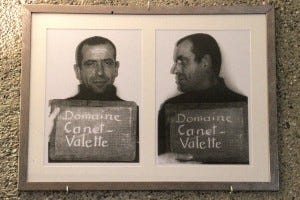Celebrating intoxification at Domaine Canet-Valette
"Did God set grapes a-growing, do you think, And at the same time make it sin to drink? Give thanks to Him who foreordained it thus-- Surely He loves to hear the glasses clink!"
Rubáiyát of Omar Khayyám, 91st quatrain, translated by Richard Le Gallienne

Alcohol has become one of society's demons. It may be socially acceptable to drink, to be merry or even drunk – and if you live in the UK, it's a rite of passage to become paralytic at least once in your life. But just as successive generations have cracked down on smoking, alcohol might now be going the same way. Health concerns, warnings about weekly limits, restrictions on sale and advertising are ever more present. Wine producing countries generally take a more relaxed view – French society regards wine as a basic human right, rather than a controlled drug. But even in France, there are increasing calls to restrict wine advertising and consumption, and no shortage of radical religious groups with outright bans on alcohol. St. Chinia…
Keep reading with a 7-day free trial
Subscribe to The Morning Claret to keep reading this post and get 7 days of free access to the full post archives.




